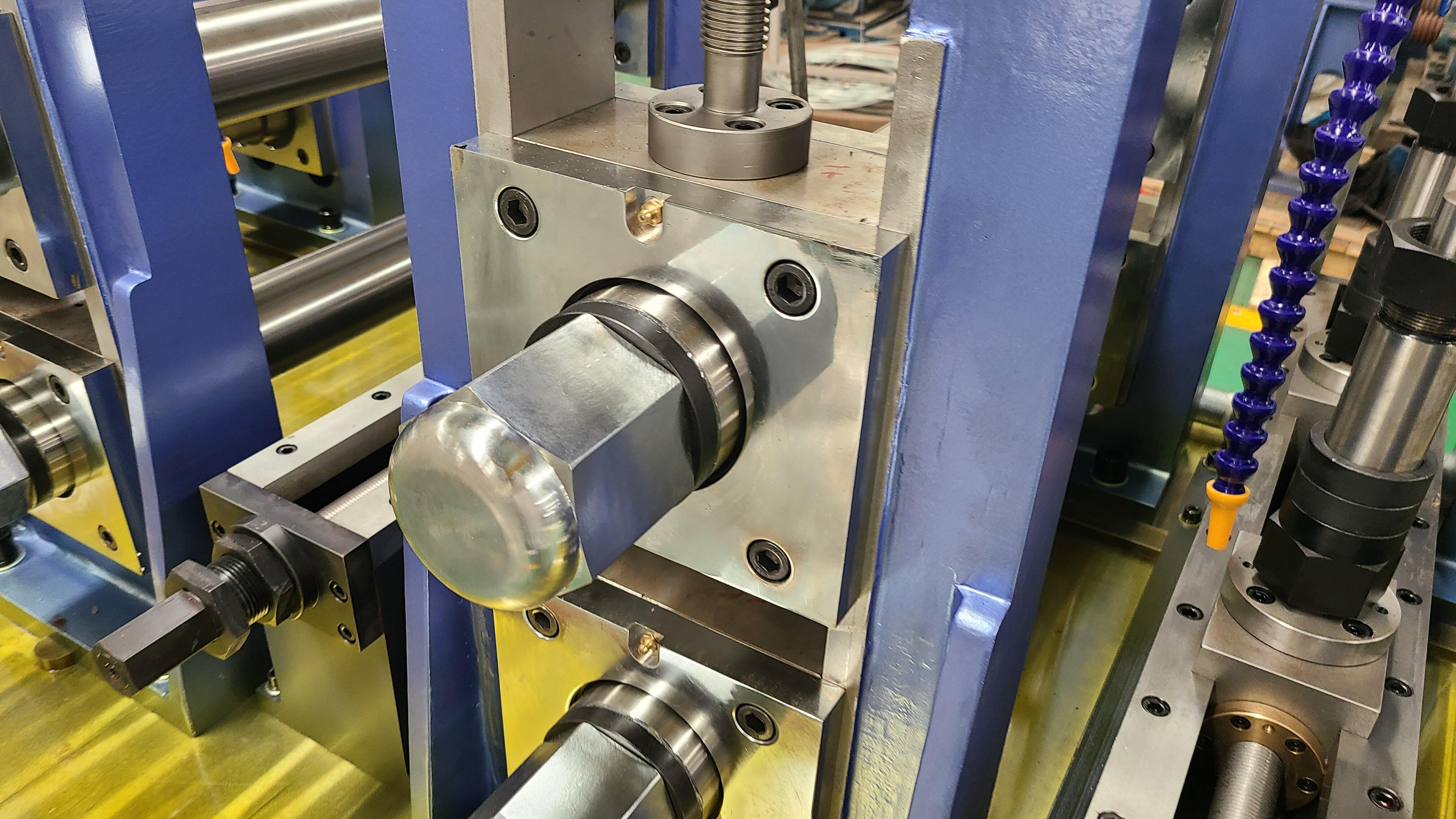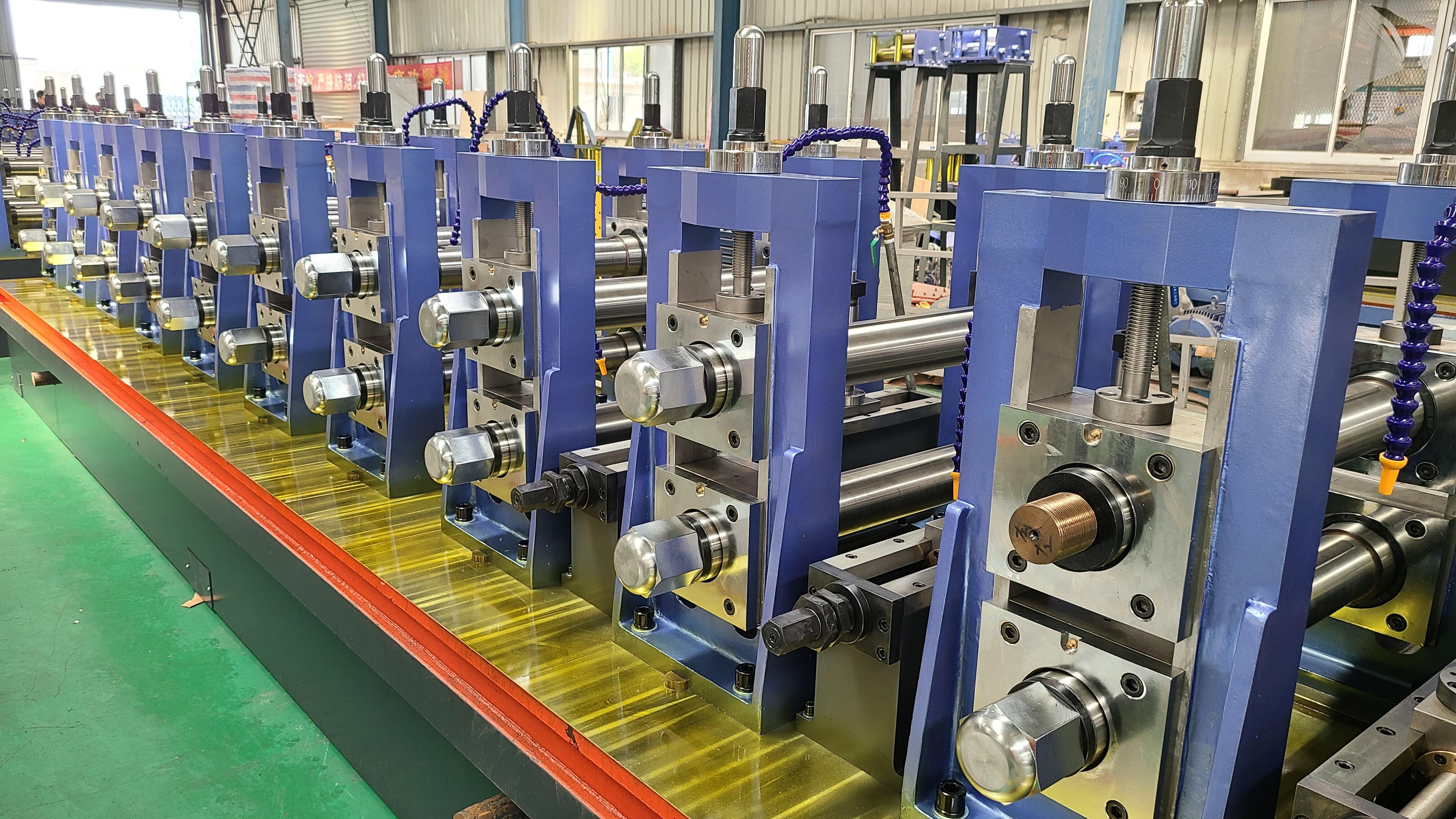ปัจจัยสำคัญสำหรับการลงทุนในอุปกรณ์การผลิตท่อ GI
The ท่อเหล็กชุบสังกะสี (GI) อุตสาหกรรมการผลิตมีการพัฒนาอย่างต่อเนื่องไปพร้อมกับเทคโนโลยีที่ก้าวหน้าและความต้องการในตลาดที่เพิ่มขึ้น เมื่อพิจารณาซื้อเครื่องผลิตท่อ GI ผู้ผลิตจะต้องประเมินหลายปัจจัยอย่างรอบคอบเพื่อให้มั่นใจว่าการลงทุนนั้นให้ผลตอบแทนที่ดีที่สุด การแนะนำอย่างละเอียดในคู่มือนี้จะครอบคลุมถึงประเด็นสำคัญที่มีผลต่อการเลือกเครื่องผลิตท่อ GI ที่เหมาะสมกับความต้องการในการผลิตของคุณ
ข้อมูลจำเพาะทางเทคนิคและความสามารถในการผลิต
ค่าประสิทธิภาพของเครื่องจักร
ศักยภาพทางเทคนิคของ ท่อ gi เครื่องจักรผลิตท่อส่งผลโดยตรงต่อประสิทธิภาพการผลิตและคุณภาพของผลลัพธ์ที่ได้ เครื่องจักรรุ่นใหม่โดยทั่วไปมีระบบควบคุมขั้นสูงที่สามารถควบคุมกระบวนการก่อรูปท่อ การเชื่อม และการชุบสังกะสี ควรเลือกเครื่องจักรที่ให้การควบคุมขนาดที่แม่นยำ คุณภาพการเชื่อมที่สม่ำเสมอ และการเคลือบชุบสังกะสีที่ทั่วถึง ความเร็วในการขึ้นรูปของเครื่องจักร ประสิทธิภาพในการเชื่อม และอัตราการผลิตโดยรวม ควรมีคุณสมบัติสอดคล้องกับเป้าหมายการผลิตของคุณ
ช่วงขนาดและความเข้ากันได้กับวัสดุ
เครื่องจักรผลิตท่อ GI มีการออกแบบมาเพื่อรองรับขนาดท่อและความหนาของวัสดุที่แตกต่างกันกัน ควรพิจารณาช่วงขนาดท่อที่คุณวางแผนจะผลิต รวมถึงความหลากหลายของเส้นผ่านศูนย์กลางและความสามารถในการผลิตที่ความหนาของผนังท่อที่ต้องการ เครื่องจักรต้องสามารถรองรับข้อกำหนดของวัสดุที่คุณต้องการผลิต ตั้งแต่การเลือกใช้เหล็กเกรดต่าง ๆ ไปจนถึงข้อกำหนดในการเคลือบผิว ตรวจสอบให้แน่ใจว่าเครื่องจักรสามารถประมวลผลความกว้างและความหนาของแถบเหล็กที่เหมาะสมสำหรับไลน์ผลิตภัณฑ์ของคุณ
ระบบอัตโนมัติและควบคุม
คุณสมบัติการอัตโนมัติขั้นสูงในเครื่องผลิตท่อ GI สามารถเพิ่มประสิทธิภาพการผลิตและความสม่ำเสมอของคุณภาพผลิตภัณฑ์ได้อย่างมาก ควรเลือกระบบที่มีตัวควบคุมลอจิกแบบโปรแกรมได้ (PLC) อินเตอร์เฟซระหว่างมนุษย์กับเครื่องจักร (HMI) และกลไกควบคุมคุณภาพแบบอัตโนมัติ คุณสมบัติเหล่านี้ช่วยลดข้อผิดพลาดจากมนุษย์ ลดของเสีย และรักษาคุณภาพของผลิตภัณฑ์ให้สม่ำเสมอตลอดกระบวนการผลิต

การรวมกระบวนการผลิต
การกำหนดค่าสายการผลิต
เครื่องผลิตท่อ GI ต้องสามารถผสานรวมเข้ากับระบบการผลิตที่มีอยู่ได้อย่างไร้รอยต่อ ควรพิจารณาความต้องการด้านรูปแบบทางกายภาพ รวมถึงพื้นที่สำหรับการจัดการวัสดุ การทดสอบในสายการผลิต และการจัดเก็บผลิตภัณฑ์สำเร็จรูป พื้นที่ที่เครื่องต้องใช้ควรช่วยเพิ่มประสิทธิภาพในการใช้พื้นที่โรงงานในขณะที่ยังคงกระบวนการทำงานให้มีประสิทธิภาพ ให้ประเมินว่าอุปกรณ์เชื่อมต่อกับระบบเสริมต่างๆ เช่น ระบบกลไกการป้อนวัสดุ และระบบจัดการผลิตภัณฑ์ออกอย่างไร
คุณสมบัติในการควบคุมคุณภาพ
ความสามารถในการรับประกันคุณภาพแบบในตัวมีความสำคัญอย่างยิ่งต่อการรักษามาตรฐานของผลิตภัณฑ์ ควรเลือกเครื่องจักรที่ติดตั้งระบบตรวจสอบคุณภาพแบบออนไลน์ เครื่องมือตรวจสอบคุณภาพการเชื่อม และอุปกรณ้วัดความหนาของชั้นเคลือบ เครื่องผลิตท่อ GI รุ่นที่ทันสมัยมักมีระบบตรวจจับและระบุตำหนิโดยอัตโนมัติ เพื่อให้แน่ใจว่าผลิตภัณฑ์ที่ส่งถึงลูกค้าเป็นของที่มีคุณภาพสูงเท่านั้น
ประสิทธิภาพในการดำเนินงานและการบำรุงรักษา
การบริโภคพลังงานและการใช้ทรัพยากร
เครื่องจักรผลิตท่อ GI แบบทันสมัยควรมีประสิทธิภาพการประหยัดพลังงานสูงสุด โดยไม่ลดทอนสมรรถนะ ควรประเมินความต้องการพลังงาน รวมถึงการใช้ไฟฟ้าในระหว่างการดำเนินงานและโหมดสแตนด์บาย พิจารณาเครื่องจักรที่มีคุณสมบัติประหยัดพลังงาน เช่น อุปกรณ์ควบคุมความถี่แบบแปรผัน (Variable Frequency Drives) และระบบจัดการพลังงานอัจฉริยะ การใช้ทรัพยากรอย่างมีประสิทธิภาพ รวมถึงการใช้สังกะสีในการชุบกัลวาไนซ์ ย่อมส่งผลโดยตรงต่อต้นทุนในการดำเนินงาน
ความต้องการในการบํารุงรักษาและความสะดวก
การบำรุงรักษาอย่างสม่ำเสมอเป็นสิ่งสำคัญต่อการรักษาสมรรถนะและความทนทานของเครื่องจักร ควรเลือกอุปกรณ์ที่ถูกออกแบบให้จุดบำรุงรักษาเข้าถึงได้ง่ายและมีชิ้นส่วนที่สามารถเปลี่ยนได้ ต้องตรวจสอบให้แน่ใจว่ามีอะไหล่และบริการสนับสนุนทางเทคนิคจากผู้ผลิตพร้อมให้บริการ ควรเลือกเครื่องจักรที่มีความสามารถในการบำรุงรักษาเชิงพยากรณ์ (Predictive Maintenance) และมีตารางบำรุงรักษาที่ชัดเจน เพื่อลดการหยุดทำงานโดยไม่คาดคิด
เทคโนโลยีและการเตรียมพร้อมสำหรับอนาคต
ความสามารถในการบูรณาการดิจิทัล
ความเข้ากันได้กับอุตสาหกรรม 4.0 มีความสำคัญมากขึ้นในกระบวนการผลิตยุคใหม่ ควรเลือกเครื่องผลิตท่อ GI ที่มีตัวเลือกการเชื่อมต่อดิจิทัลสำหรับการตรวจสอบการผลิต การเก็บรวบรวมข้อมูลและการวิเคราะห์ ความสามารถในการผสานรวมกับระบบการจัดการการผลิต (MES) และซอฟต์แวร์ระบบวางแผนทรัพยากรองค์กร (ERP) จะช่วยให้การวางแผนและการควบคุมการผลิตมีประสิทธิภาพดียิ่งขึ้น
ศักยภาพในการอัพเกรด
พิจารณาว่าเครื่องจักรสามารถปรับตัวเข้ากับความก้าวหน้าทางเทคโนโลยีและข้อกำหนดของตลาดในอนาคตได้อย่างไร มองหาอุปกรณ์ที่สามารถอัปเกรดด้วยคุณสมบัติใหม่ ๆ หรือปรับเปลี่ยนเพื่อรองรับความต้องการในการผลิตที่เปลี่ยนแปลงไป ความมุ่งมั่นของผู้ผลิตด้านการวิจัยและพัฒนาจะบ่งชี้ถึงศักยภาพในการพัฒนาและสนับสนุนในอนาคต
การสนับสนุนจากผู้จัดจำหน่ายและมูลค่าการลงทุน
ชื่อเสียงของผู้ผลิตและเครือข่ายบริการ
ความน่าเชื่อถือของผู้ผลิตเครื่องผลิตท่อ GI มีผลกระทบอย่างมากต่อความสำเร็จในระยะยาวของคุณ ศึกษาชื่อเสียงของผู้จัดจำหน่ายในตลาด ประสบการณ์ในอุตสาหกรรม และประวัติความพึงพอใจของลูกค้า ประเมินการครอบคลุมของเครือข่ายบริการ เวลาตอบสนองสำหรับการสนับสนุนทางเทคนิค และความพร้อมใช้งานของหลักสูตรฝึกอบรมสำหรับผู้ปฏิบัติงานของคุณ
ต้นทุนรวมของการเป็นเจ้าของ
นอกเหนือจากราคาซื้อเริ่มต้น ให้คำนวณต้นทุนการเป็นเจ้าของโดยรวม รวมถึงค่าติดตั้ง ค่าฝึกอบรม ค่าบำรุงรักษา และค่าใช้จ่ายในการดำเนินงาน ควรพิจารณาปัจจัยต่าง ๆ เช่น ประสิทธิภาพการใช้พลังงาน ความต้องการในการบำรุงรักษา และอายุการใช้งานที่คาดไว้ เมื่อประเมินเครื่องจักรที่แตกต่างกัน ในการลงทุนครั้งแรก เครื่องจักรที่มีคุณภาพสูงอาจมีราคาสูงกว่า แต่มักจะให้คุณค่าที่ดีกว่าในระยะยาวผ่านค่าใช้จ่ายในการดำเนินงานที่ลดลง และเพิ่มประสิทธิภาพการผลิต
คำถามที่พบบ่อย
เครื่องผลิตท่อ GI โดยทั่วไปมีอายุการใช้งานกี่ปี
เครื่องผลิตท่อ GI ที่ได้รับการบำรุงรักษาอย่างดี มักจะทำงานได้อย่างมีประสิทธิภาพเป็นเวลา 15-20 ปี อย่างไรก็ตาม อายุการใช้งานขึ้นอยู่กับปัจจัยต่าง ๆ เช่น ความเข้มข้นในการใช้งาน คุณภาพในการบำรุงรักษา และสภาพแวดล้อมในการทำงาน การบำรุงรักษาเป็นประจำและการปฏิบัติที่ถูกต้องสามารถยืดอายุการใช้งานของอุปกรณ์ได้อย่างมาก
การติดตั้งและดำเนินการทดสอบเครื่องผลิตท่อ GI ใหม่ใช้เวลานานเท่าใด
การติดตั้งและดำเนินการมักใช้เวลาประมาณ 2-4 สัปดาห์ ขึ้นอยู่กับความซับซ้อนและขนาดของเครื่องจักร ช่วงเวลานี้รวมถึงการติดตั้งอุปกรณ์ การปรับเทียบ การทดสอบ และการฝึกอบรมผู้ปฏิบัติงาน การทำงานร่วมกับทีมติดตั้งที่มีประสบการณ์สามารถช่วยลดเวลาที่เครื่องจักรหยุดทำงานระหว่างการเปลี่ยนผ่านได้
ข้อกำหนดในการบำรุงรักษาหลักสำหรับเครื่องผลิตท่อ GI คืออะไร
การบำรุงรักษาเป็นประจำรวมถึงการตรวจสอบลูกกลิ้งขึ้นรูป อุปกรณ์เชื่อม และระบบชุบกัลวาไนซ์ในทุกๆ วัน ส่วนงานที่ทำรายสัปดาห์หรือรายเดือนประกอบด้วยการเปลี่ยนน้ำมันหล่อลื่น การตรวจสอบการจัดแนว และการปรับเทียบระบบควบคุม ควรปฏิบัติตามกำหนดการบำรุงรักษาเชิงป้องกันอย่างเคร่งครัด เพื่อให้แน่ใจว่าเครื่องจักรทำงานได้อย่างมีประสิทธิภาพและมีอายุการใช้งานยาวนาน

